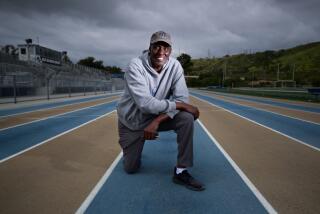WORLD SPORTS SCENE : Burnout Was Never Factor for Rodnina
It must have been amusing for Irina Rodnina to hear Soviet pairs skater Ekaterina Gordeeva say at Halifax, Canada, at the recent World Championships that she is losing her motivation after winning four world titles and an Olympic gold medal.
Outlasting one pairs partner before going on to another, Rodnina won 10 world championships and three Olympic gold medals for the Soviet Union before retiring in 1980. She recently signed a three-year contract to coach at the International Ice Castles at Lake Arrowhead.
“I think they need new touches, new programs, original ideas,” Rodnina said of Gordeeva and her partner, Sergei Grinkov, apparently agreeing with the critics who say the pair’s act has gone stale.
“It was easier for me because I had my motivations. First, I changed partners, then changed coaches. I always had something to prove. But more than anything else, I loved competing.”
The Soviets have dominated pairs, winning 23 world championships in the past 26 years and every Olympic gold medal since 1964. Rodnina said they emphasize pairs and dance more than individuals, which is the opposite of the U.S. approach.
“These decisions are made for the girls at an early age,” she said. “The best skaters, the ones who are the right size and have the strongest personalities, are taken for pairs. The most attractive become dancers. The balance go to singles.”
Although some Soviet pairs coaches have developed a reputation for creativity, Rodnina said that is not entirely deserved.
“I like the Canadian programs better,” she said. “They relate better to the music and have more original touches. They are better to watch. But we take their elements and make them so shiny that nobody ever recalls that we didn’t do them first.”
Under the circumstances, the U.S. pairs champions, Kristi Yamaguchi of Fremont, Calif., and Rudi Galindo of San Jose, could not have expected to finish higher than fifth, the same as last year.
After their coach, Jim Hulick, died in December, John Nicks of Costa Mesa took over. But he coached them long-distance. Before the World Championships, Galindo spent a week with Nicks, then took the instructions to Edmonton, Canada, where Yamaguchi lives while training with her singles coach.
“It was not a geographical challenge,” Nicks said. “It was a geographical nightmare. I saw them more in the last three days than I did in the last three weeks. That’s an advantage, isn’t it?”
Yamaguchi, who finished fourth in singles, said she will continue competing in pairs only if Galindo joins her full time in Edmonton.
“If I had my choice, I’d stay in California, too,” she said. “But it’s a sacrifice I have to make.”
Galindo seems prepared to make the same sacrifice.
“Wherever Kristi goes, I’ll follow,” he said.
Despite objections by the Soviets and East Germans, Natasha Kuchiki, 13, of Canoga Park, was allowed to skate at Halifax with her pairs partner, Todd Sand of Thousand Oaks, even though she is too young by a year according to International Skating Union rules. Explaining the rationale for granting Kuchiki an exemption, ISU President Olaf Poulson of Norway said, “We have some interest in skating, not in rules.”
Only 18, U.S. champion Todd Eldredge, who finished fifth in his first World Championships, is often compared to Brian Boitano. Like Boitano at 18, Eldredge is technically adventurous but lacks artistic presence.
Boitano didn’t become a complete skater until five years later in 1987, when he discovered Canadian choreographer Sandra Bezic-Ricci. She taught him to interpret his music, which enabled him to win the Olympic gold medal in 1988 and has inspired his continued improvement as a professional.
Eldredge, who trains in San Diego, may soon make a similar leap. He and his coach, Richard Callaghan, met recently with Bezic-Ricci in Toronto.
“We’d like to see her in the future, if she’s got time for us,” Callaghan said.
Bezic-Ricci choreographed “Carmen on Ice,” the HBO movie that stars Boitano and Katarina Witt. The rumor was that the movie was pulled from the theaters in West Germany because of bomb threats. But that was a poor translation.
The real story is that West German reviewers are calling the movie a bomb. At a recent showing in Hamburg, only one person attended. The movie, however, has some good reviews in the United States.
International Notes
The local telephone book in Halifax has a revised drawing of skaters on the cover. The original had to be pulled because the woman’s costume was too revealing. . . . The British judge didn’t like Christopher Bowman’s original program, which he performed to American-Indian music while wearing a headband. “I don’t know if they got it,” he said of the judges. “Do I have to put a feather in my head and wear a sign that says, ‘I’m an Indian?’ ” . . . Bowman said last year’s move to Lake Arrowhead was a shock after he trained for 17 years in Los Angeles. “It was like they put me in a plastic bubble and took me to Venus,” he said.
Jill Trenary is Carlo Fassi’s fourth world champion. He coached Peggy Fleming, Dorothy Hamill and Great Britain’s John Curry. He also coached British Olympic champion Robin Cousins. . . . Surya Bonaly, the 16-year-old French champion, is improving as a skater, finishing ninth at Halifax, but she needs work on etiquette. When she received a low score from a British judge, Bonaly cupped her hands and booed.
The tour of Olympic and world champions will stop at the Forum Wednesdau. . . . According to the Hungarian press guide, dancers Klara Engi and Attila Toth perform their long program to the score from the movie, “Horses Are Shot, Aren’t They?”
More to Read
Go beyond the scoreboard
Get the latest on L.A.'s teams in the daily Sports Report newsletter.
You may occasionally receive promotional content from the Los Angeles Times.




